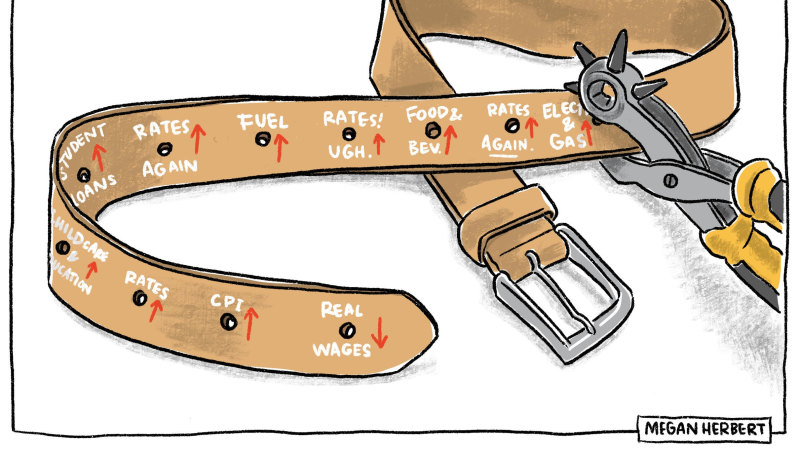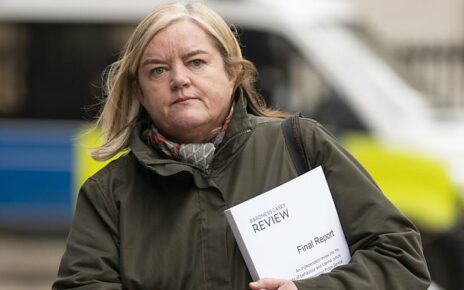Save articles for later
Add articles to your saved list and come back to them any time.
Credit: Illustration: Megan Herbert
To submit a letter to The Age, email [email protected]. Please include your home address and telephone number. No attachments, please include your letter in the body of the email. See here for our rules and tips on getting your letter published.
UNIVERSITY STUDENTS
We must better support our trainee teachers
As I read Madeleine Heffernan’s article (The Age, 26/5) about the financial stresses experienced by student teachers, I wondered how serious our government is about “stemming the teacher shortage”. I suggest it looks at adopting the full-scale recruitment and support that got me into the teaching profession in the ’50s to help educate the Baby Boomers.
South Australia’s Education Department started its trawling for recruits in the top two levels of state high school, where one could sign up to become a preliminary probationary student and later a probationary student. Not only did we not have to pay for our books, but each fortnight we received some modest pocket money, which usually covered the cost of our student fares.
As I had opted to become a high school teacher, I then attended Adelaide Teachers College in tandem with my university course for four years, after which I had a bachelor of arts and a diploma in secondary education. Throughout we were supported by the Education Department, which paid for our courses, our books and a fortnightly allowance. In return, we needed to “sign on” the college’s attendance sheets, were contracted to a three-year bond and knew we were likely to be sent to teach in a country town.
During term holidays, we spent several weeks a year “prac teaching”, as placements were then called. Inspectors vetted our performance and give us feedback on how we could improve, or they might compliment us on our approach.
At a reunion a few years ago, some of us spoke up about the opportunities these scholarships had given us. There was the lad from the country who became the first graduate in his family and loved being a science teacher. Or in my case, the girl from a migrant family who did not mind the three-year bond as teaching was the profession she would have chosen anyway.
What a contrast with the plight of final-year teaching student Molly, in Heffernan’s article, who is finding her course “completely unsustainable”.
Janna McCurdy, Northcote
A win for Treasury but a loss for our community
As a beneficiary of a free tertiary education in the 1980s and now as a mature-age university student, it is interesting to witness first-hand the dire situation today’s students find themselves in, and the folly for society on many levels of the economic rationalism that is driving the tertiary educational sector.
The federal government is in receipt of an inflation-linked HECS repayment schedule from former students who are now in the workforce. This debt was benign when inflation was low but now, with inflation escalating, it has become an increasing burden on graduates. The government, effectively, is profiting from this.
The additional problem that has been triggered by this regressive approach is that the burden of the indexed HECS delays many aspects of life for graduates. For example, home ownership is delayed or possibly precluded as young graduates remain chained to their degrees with limited options to ever extinguish the debt.
The completely inequitable nature of the scheme strongly favours students from wealthy families, with parents or even grandparents able to fund the debt on behalf of their children. The universality of tertiary education under the indexed HECS platform is put at risk as it becomes the domain of wealthy children only.
It is almost a daily occurrence that we hear about the shortage of motivated young teachers. Indexed HECS is very much a factor impacting on decision-making for young graduates.
They face very difficult decisions as teaching is poorly paid and they are saddled with an escalating financial burden at a time when they should be embarking on this extremely important career path for themselves and, importantly, the community. While this is a financial win for federal Treasury, it is a significant loss to the Australian community and society in the long run.
Nick Edwards, South Yarra
LETTERS
Purely the thrill of the kill
Jewel Topsfield witnessed cruelty in the “volley of six or seven shots” it took to kill the duck (Sunday Age, 28/5). This is the reality of recreational duck shooting. And that bird was the lucky one, to not be left suffering.
Victoria’s Waterfowl Wounding Reduction Action Plan 2022–2026. obtained under an FOI request, detailed wounding rates of birds between 26 and 47per cent.
It reports studies that showed 73 to 97per cent of wounded birds died, not necessarily directly from gunshot wounds but from the indirect consequences of their injuries, which saw them succumb to starvation, predation or extreme weather conditions.
People camp, travel in four-wheel drives, plant trees, install nest boxes, spend time outdoors, and cook a meal without shooting ducks. Duck hunting is all about the thrill of the kill.
Tania Begg, Rushworth
True number of breaches
According to your article, during the 2022 duck shooting season, Game Management Authority officers found 38 breaches of hunting and public safety laws.
Victoria has thousands of waterways where shooters fire their guns, including wetlands listed under the international Ramsar Convention, which were created to protect local and northern hemisphere migratory birds, as well as our endangered native species. I doubt that the authority’s compliance officers can police every wetland in the state, so their 2022 tally does not truly reflect what is really happening out there.
Jan Kendall, Mount Martha
Intimidating approach
Re “Burt responds to Hawks claims” (The Age, 27/5). I would not pretend to have a deep understanding of what has gone on at the Hawthorn Football Club in regard to Indigenous players, but some behaviours have to raise questions. Can anyone cite another workplace where the coach, assistant coach and welfare officer (or their equivalents) are in attendance, or deem it necessary to be in attendance, when a player (or equivalent) ends a personal relationship? There are some serious issues to address here.
Graeme Gardner, Reservoir
Respectful disagreement
I felt despair after reading Kate Halfpenny’s column about the online abuse she received following her previous column (Comment, 27/5).
I echo her questions; why are so many people so mean-spirited? Why can’t we hear the moderate thoughts of others without forming hateful opinions? If we disagree, why can’t we say so in a respectful, non-violent way? We should all take a moment to think “how would I feel if I were treated like this?” before putting angry fingers to the keyboard.
Fiona White, Alfredton
Abusers’ self-loathing
Why are people so unkind to Kate Halfpenny? From personal experience, I think it is because they feel lousy about themselves.
I cringe to think how I behaved to my wife for so many years. I was probably narcissistic (and having at nearly 80 been diagnosed as mildly autistic, maybe that was a factor too) which is based in self-loathing. Jealousy probably plays a part too, so if you can find it in yourself, direct some pity towards these sorry folk.
Peter Hepburn, Claremont, Tas
Just change the channel
The British are the best in the world in organising events such as the coronation. I tuned in to the ABC to watch, to see the guests arrive, to see what they were wearing and to listen to the glorious music. I am not a monarchist but I was not expecting to have an Australian panel discussing Indigenous rights over the top of these things.
So I changed channels and found a commercial one broadcasting a direct feed from the BBC. I don’t understand why people who just wanted to see the coverage did not change channels instead of abusing Stan Grant and the ABC.
Kathryn Howell, Hawthorn
Our ongoing shame
As a Labor voter, I am particularly appalled at the timidity shown on the issue of our incarceration camps offshore. The expense is galling enough but the savage cynicism to continue the farce of highlighting “boat people” over aeroplane arrival overstayers is ruthless. To be shamed by the UNHCR, and our domestic incarceration inconsistencies, makes us ineligible to be global citizens on any high moral ground.
Peter Berenyi, Howes Creek
Restore public service
The PwC debacle is the price we are paying for the privatisation of consultation and other roles which the public service used to do. Save money and bring back a strengthened public service.
Barry Kranz, Mount Clear
Protecting cyclists too
It is disappointing, but not surprising, that the City of Melbourne has undertaken to improve pedestrian, but not cyclist, safety in the CBD (The Age, 27/5). Recently I watched a cyclist in Swanston Street try to negotiate past a line of delivery vans and then be knocked over by a group of pedestrians wandering across the street. The CBD is known for having the worst cycling infrastructure in the country. Cycle lanes need to be separated and clearly marked.
Kay Howden, Northcote
Watchful parental eye
The increasing numbers of mothers in full-time employment (The Age, 27/5), may be having far reaching implications. Many mothers (and fathers) have to work longer hours to keep a roof over their heads and food on the table. This means that their children may be left unsupervised for increasing amounts of time.
We also know there are increasing problems with depressed, unhappy children and violent incidents involving young people. Young teenagers going through puberty are at a time in their lives when risk taking is increased, they are highly susceptible to addictions, and there are issues with social media such as bullying. Having mum (or dad) around a bit more to keep an eye on what is going on in their lives is invaluable.
Hilary Vaughan, Williamstown
The unspoken issue
We talk about the inability of (some/many) people to buy a first home, we talk about the rental crisis, and we talk about the overwhelming need for affordable, state-owned housing. However, we do not talk about the amount of foreign-owned, vacant houses that exist in Melbourne, do we?
Jae Sconce, Moonee Ponds
What’s driving price rises
Re “Minister backs tower that will swallow heritage substation” (The Age, 26/5). Planning student Lachlan Smith says “as someone looking down the chasm of buying a house one day, that sort of prioritisation [of heritage] seems askew to me”.
However it is perfectly possible to combine protection of heritage buildings with provision of new housing. For evidence we need only to look at the Sarah Sands Hotel in Sydney Road, Brunswick. Here an enlightened developer with support from Merri-bek Council has restored the goldrush era hotel and constructed a seven-storey apartment block behind it in a way that is fairly unobtrusive.
There are many reasons for housing unaffordability. These include population pressures, negative gearing, capital gains tax discounts and developers’ determination to maximise profits by building the tallest tower and the most number of apartments with the least possible provision of affordable housing. Destroying Melbourne’s character by the removal of heritage buildings and the overshadowing of parks would make very little difference to prices.
Elisabeth Jackson, Brunswick
So many risks with AUKUS
The Australian public has been given no proper explanation of the strategic rationale behind the AUKUS deal. There is the enormous financial cost, the great uncertainty of its success, and the fact that it will distract and divert money from us adequately addressing global heating. The agreement ties us to a country that is becoming divided, dysfunctional and politically unstable.
Defence Minister Richard Marles has repeatedly used the word “seamless” to describe the degree of closeness required in our relationship with the US for the AUKUS deal to be successful. I fear that Marles, without fully realising it, is well on the way to achieving a “seamless” transfer of Australian sovereignty to an unstable United States. It is not impossible that the deal will be trumped.
Ian Bayly, Upwey
Tone it down a little
OK, OK, I know I’m a prude but did there really need to be so much swearing and bad language on SBS’s Alone Australia? I loved the program, the resilience, perseverance, innovation, location – but it was on at 7.30pm and children are still viewing. Australians have a reputation for being “ocker” and “bogan” and the language did little to dispel this.
Lindsay Markham, Mount Waverley
Longing for the fruit
Re “The trees our city could never leaf without” (The Age, 27/5). Our locust tree is more than 40-years-old. At what age might we expect its fruit to turn into locusts like those from the 170-year-old tree at St Monica’s Primary School in Footscray?
John Collins, Seaford
A win-win if Voice wins
The outcome of a victory for the Voice referendum in simple terms: despite opposition from some First Nations representatives, it will likely benefit First Nations people and leave Australia’s reputation unsullied. The negative effect on those who opposed the Voice, often with extreme and unsubstantiated claims, will be virtually nothing.
Bill Pimm, Mentone
Too much negativity
We have heard a great deal about Peter Dutton’s objections, misgivings and fears about the Indigenous Voice to parliament. Now it is time for him to propose constructive changes to its wording and overall operation.
Kevin Burke, Sandringham
AND ANOTHER THING
Politics
It is far better to be a birdwatcher than a bird shooter (28/5).
Charles Davis, Hawthorn
The Voice: Push the eject button on Peter Dutton.
Julie Ottobre, Sorrento
Is the truth the first casualty in the battle between the No and Yes cases?
Hans Paas, Castlemaine
While government debt focuses the minds of US lawmakers, mass shootings in schools apparently, and tragically, do not.
Matthew Hamilton, Kew
I wonder what actions would have occurred if Noel Pearson or Marcia Langton had been on the ABC board.
Melina Smith, Brighton
Economics
What’s next? Will people be banned or shamed for having a holiday home?
Ian Anderson, Ascot Vale
Cutting public service numbers can only be justified/acceptable if expenditure on consultants and labour hire is reduced to zero.
Ken Courtis, Golden Square
If private schools keep increasing fees, they’ll have fewer students. Why don’t they cut some ″glitz″ in order to meet the cost of payroll tax?
Garry Meller, Bentleigh
Furthermore
I preferred the novels of Amis senior (Kingsley), but son Martin (28/5) wrote the best and funniest book reviews on the planet.
Michael Read, Carnegie
Apart from turning off the sound, how do we get rid of fatuous comments from past AFL players?
Richard Sykes, Bell Park
Certainly the bottom teams get the worst umpires.
Michael McKenna, Warragul
The irony of NAB demanding senior staff return to the office while it closes branches and expects customers to bank online.
Ian Macdonald, Traralgon
ICPOTA could be found lurking in Target (25/5). Older readers may remember the ad campaign, “In the Classified Pages Of The Age”.
Peter Mitchell, Hampton
Patrick Elligett sends an exclusive newsletter to subscribers each week. Sign up to receive his Note from the Editor.
Most Viewed in National
From our partners
Source: Read Full Article



